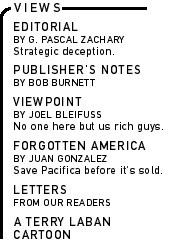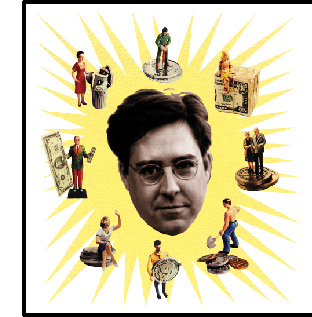

|

|

|

|
| |
|
|
|
One Market Under God: A lot of people seem to have very strong feelings about Tom Frank, editor of The Baffler and author of The Conquest of Cool and, most recently, One Market Under God. For some, he is the great leftist impresario of our times, the most brilliant cultural critic of his generation, a witty polemicist, and a man with an uncanny ability to expose American consumer culture's (equally uncanny) ability to co-opt and defang just about every gesture of cultural rebellion a would-be counterculture tries to throw at it. Others--quite a lot of them, actually--react to the very mention of his name with anger; at times with what can only be described as visceral hatred. I have never understood entirely why. Perhaps, for some, he is an embodiment of frustration. After all, the usual criticism of Frank is that he is content to be a chic prophet of doom, a blander, Americanized version of stylish French theorists of the past like Jean Baudrillard, who have manufactured a kind of romantic heroism out of accepting the total, absolute, paranoid ascendancy of the capitalist/consumer "system," that the best we can manage is to float above it with a certain ironic detachment, the smirking knowledge that unlike those pathetic dweebs actually trying to fight back somehow, we at least know just how profoundly we are fucked. That would be annoying. But it has always struck me that such criticisms are more
In One Market Under God, I think Frank has actually done us some excellent service. If nothing else, he has been willing to stoically wade through a mass of inspirational business literature that undoubtedly would have had almost any other researcher of his political sensibilities fleeing in disgust and terror. Frank manages to present it in a way that makes it almost palatable, largely by making fun of it. In doing so, he also makes an interesting historical argument: The late '90s mark the beginning of an entirely new strategy for validating social inequality. The old strategy, which perhaps had its greatest flowering in the days of Ronald Reagan, was the classic right-wing approach. It is both deeply cynical and notoriously effective. With one hand, you unleash the power of the market, throwing the world into a tumult of insecurity and all traditional verities into disarray; then, with the other, you offer yourself as the last bastion of order, a stalwart of the authority of churches and fathers against the barbarians one has oneself unleashed. Hence the two wings of the Republican Party: libertarian free-marketeers and the "family values" Christian right. The problem with this formula, Frank notes, was that it only worked insofar as the battle could be kept on cultural grounds; on bedrock economic issues, most working-class Americans were clearly left of center. So the cultural battles of the '60s, notably, of hardhats versus hippies, had to be reinvoked, over and over again, in a thousand different ways: pointy-headed bureaucrats won't let your children salute the flag; dissolute Hollywood execs married to ex-flower children want to turn your kids against God; hairy lesbian academics promote bad, unfamiliar sorts of sex and drugs that will undermine the wholesome bodies of America ... only we can defend you! By the mid-'90s, Frank argues, capitalism found a new and better formula. The logic went something like this: Capitalism is the result of consumer choices. Anyone who buys a product is, in effect, voting; these billions of daily votes are far more revealing of what people want than a vote they might cast once a year in some election. In buying a corporate product, then, people are in effect indicating their approval not only for that product, but for the entire system of relations which brought that product into existence. Therefore, corporations are an expression of popular will. This argument in itself was hardly new; capitalists have always liked to talk this way, and the fall of the Berlin Wall made it even easier to do so. In the '90s, what was new was the vigor with which market boosters began to adopt the populist rhetoric that originally had been fashioned a century before to attack the capitalists themselves. If corporations are the expression of popular will, it stands to reason that anyone who might challenge their right to bring those products before the people in any way they see fit is an elitist. Object to Ford firing a thousand workers and moving their plant to Mexico? Obviously, you're a snob; the ordinary folk who buy those cars know better. Pursuing antitrust laws? You are simply an elitist spitting on those same consumers; if they didn't want Microsoft to be a monopoly, they wouldn't be buying Windows 98 ... and not to mention all those janitors and firemen who now own Microsoft stock. That is the other great cant of the age: Everyone is now a capitalist. In a time that saw some of the greatest economic inequalities in American history, the Wall Street Journal announced that the spread of stock ownership meant that our country had finally realized the economic dreams of Karl Marx. Indeed, some of the silliest rhetoric of the time came when market enthusiasts began posing not just as populists but revolutionaries, a trend that went to evermore bizarre lengths in the endless hype about the "New Economy." Twenty-something goateed millionaires were the new Vietcong, striking fast and unexpectedly to upend the corporate social order, destroying the old dinosaurs, never missing a chance to best or humiliate the stodgy old gray-flannel types who had been so stupid and complacent to think themselves the crown princes of the financial world. Here, market populism actually did begin to target the same villains as the old populism: the chauffeured-limousine, horse-and-yacht set. But this time, the representatives of the Common Man were just another pack of younger, hipper businessmen. Bill Gates as everyman. All this is well worth making fun of, and it's hard to imagine anyone better cut out for the job. But I do think that Frank's critics are not completely beating at the air here. If one merely describes corporate ideology, even if only to laugh at it, one misses out on some things, particularly the ways in which we might be more powerful than we're inclined to think. To take one example: Why, precisely, did the old right-wing formula, which had served capitalists so well since at least the 1850s, suddenly seem like it was running out of steam? Of course, it's not entirely clear it really was; but if true, I would like to offer a suggestion. Perhaps it is because the cultural co-optation Frank has spent so many years denouncing is actually a double-edged sword. It's hard to think of any other reason why the old battles of hippies and hardhats from the '60s could have evolved, in 1999, into the famous alliance of Turtles and Teamsters on the streets of Seattle. The '60s counterculture has been thoroughly assimilated; as a result, hippies and hardhats now tend to find they have an awful lot in common; as another result, even Jimmy Hoffa can end up marching (however briefly) with anarchists. As for market populism itself, well--apart from the always-interesting question of whether anyone actually believes this stuff--can all this strange rhetoric about social revolution and the fall of an arrogant ruling class really be taken as a sign of strength? It's not enough to point out that it is obviously untrue. The really puzzling thing is why elites feel they have to say it in the first place. A lot of it has a strange smell of desperation. But why such desperation, and of all times, now? After all, American elites would seem to be doing awfully well. In fact, it's hard to think of any ruling class in human history that has been anywhere near so successful: Not only do they dominate the world economically, culturally and militarily as never before, they do so at almost no real personal risk. Unlike ancient Roman or Egyptian or Chinese elites, who managed to achieve similarly total levels of control over their respective corners of the world, they stand almost no chance of being murdered in some palace intrigue; unlike previous capitalists, it would be hard for even the most timid to come up with a plausible suggestion as to who would be likely to actually hang them from the lamp-posts in the foreseeable future. So why the insecurity? Shouldn't these people be celebrating themselves? Telling the world how great they are? Why the need, instead, to try to convince the world that, actually, they are being bested and humiliated by egalitarian hipsters? What are they afraid of? Do they know something they're not telling us?
|


